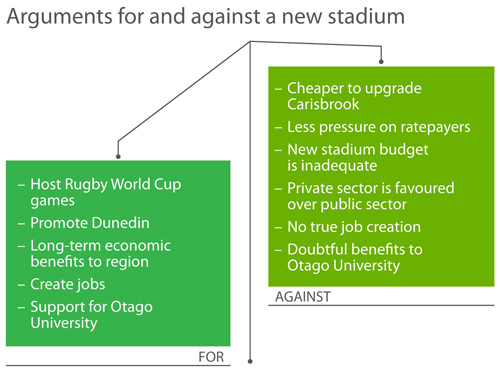Arguments for and against the stadium
What supporters said
Supporters agreed with the Trust that the stadium would:
- be affordable
- promote Dunedin worldwide through media coverage of the Rugby World Cup, attracting more residents, tourists and business developments
- bring economic benefits through large events held there, from sports games to concerts and conferences
- create jobs during and after construction
- support the university to grow and attract students.
What opponents said
Many opponents preferred the much cheaper option of upgrading Carisbrook. Others liked the idea of a new stadium but argued that it should be funded privately, not through rates (public money). Some asked why the New Zealand Rugby Union and Otago Rugby Union were not contributing. They also questioned whether the public had received enough information to assess the risks.
Opposing arguments included the following.
- Many Dunedin ratepayers were relatively poor or elderly and couldn't afford a rates increase. That increase was likely to be much more than $37 or even $66 per year because of interest incurred on the council debt.
- The stadium was likely to cost more than $188 million because the budget didn't include things like broadcasting facilities, restaurants or road relocation.
- Long-term economic benefits were doubtful because:
- other stadium developments around the country would cancel out any advantage Dunedin might have had
- the private sector would benefit much more than the public sector, which would be paying off the stadium for years
- Dunedin's population of 110,000 (194,000 regionally) wasn't large enough to support on-going major events in a 30,000-seat stadium.
- Most on-going jobs created would simply replace those lost at Carisbrook.
- The stadium probably wouldn't attract university students because the country didn't have an American-style tradition of university sports. (Reduced student fees or scholarships might, however – and at a lower cost.)
Opponents argued that, long term, money spent in areas like education, health and communication technologies would benefit Dunedin people much more than a stadium. Accusations of conflicts of interest were also made (for example, that the Trust Chairperson was related to someone who owned land on the proposed site and that the managers appointed to the redevelopment were also involved in the Trust).

